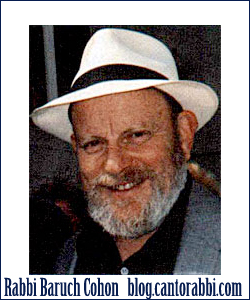A young boy comes home from Hebrew School, and his father asks him what he learned today.
Today we learned how the Jews left Egypt, says the son.
Really. Tell me about it, the father says, settling back in his chair.
Well, they were running out of Egypt and they got to the Red Sea, and the Egyptian army was chasing them and they didnt know what to do. So they yelled to Moses. And Moses called out the Navy and they put pontoons in the water, and the people started to cross on the pontoons. But the Egyptians had their own pontoons and they were still chasing them. So Moses called out the Air Corps and they bombed the Egyptians
Daddy sits up straight. What? Is that what your teacher said?
Well no. But if I told you what he said, youd never believe me.
OK, you heard it before. But this week as we start rereading the Book of Deuteronomy, we need to remember what the teacher says. Teachers take a good deal of punishment these days for student failures. Maybe they could do better. Maybe we all could. But the Book of Deuteronomy reminds us that teachers have great importance in our lives. Nowhere in this fifth book of the Torah do we read a direct quote from G-d. Those messages appear many times in the preceding four books, but not here. Here Moses is spending his last days on earth reviewing the lessons of those previous books. And our sages emphatically insisted that this book, which they called Mishneh Torah the repetition of Torah — is no less sacred and no less important than the other four. Our first and greatest leader, whom we traditionally call Moshe Rabbeynu Moses our Teacher is adding his personal input to the history his people lived and the laws they received.
In fact, when we memorialize our parents who are no longer with us, we traditionally use the terms avi mori or immi morati my father or mother my teacher.
Moses farewell speeches bring up some of the most basic and most stirring thoughts and principles in the entire Torah.
Best known of these, of course, is Judaisms one-line creed: Shma Yisroel Hear, O Israel, the L-rd is our G-d, the L-rd is One. Just as there is only one G-d, one Creator and motivator for every individual whether great or insignificant by human standards, so every individual has the same right to equal justice. In the very first chapter of Deuteronomy, Moses reminds us not to show favoritism in judgment. Do not respect persons in judgment. Listen to the little guy just as closely as to the big shot. This principle of uncorrupted justice led the sages of the Talmud to declare that every judge who renders righteous judgment, Scripture considers him a partner of the Holy One in the work of Creation.
Fairness in dealing with our fellow human beings is not limited to the court of law. We have a responsibility to treat people properly whether they owe us money or we owe them, whether they are our relatives or strangers, whether we share the same national or ethnic background or not, and presumably whether they are native citizens or illegal immigrants. Surely we want to help our own people and we should. But we have to guard against cheating others. One rule for the native-born and for the stranger among you. Thats what the Book of Deuteronomy commands.
Thats what my teacher said.


